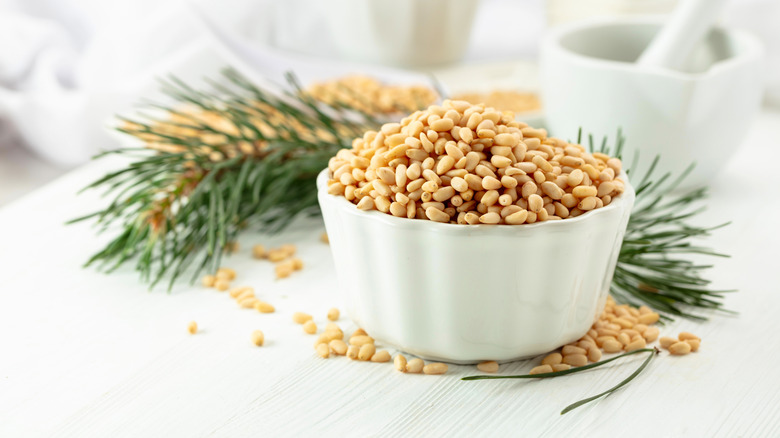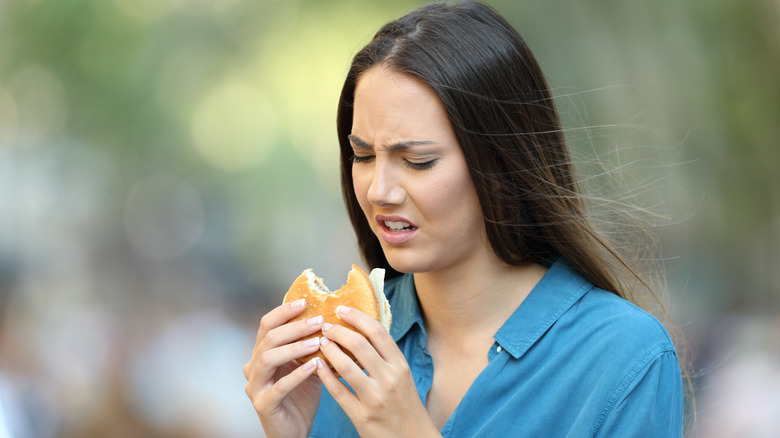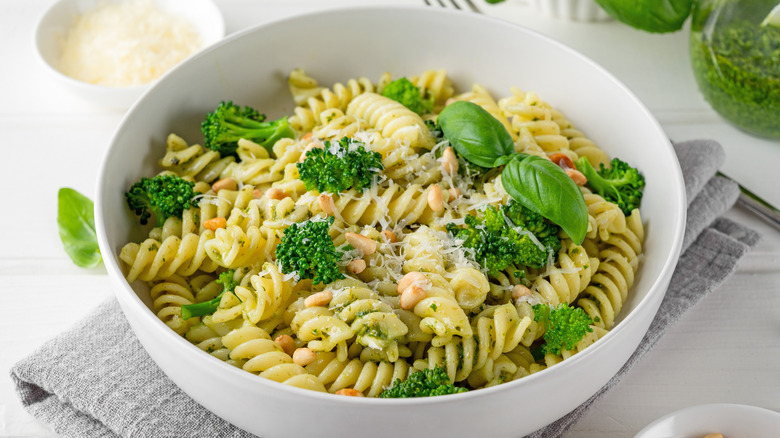For Some People, Eating Pine Nuts Has An Unexpected Side Effect
Pine nuts are the kind of ingredient that you can throw on top of a lot of dishes to make them feel more polished. I've found that they're really good when toasted and tossed into salads, scattered over pasta, or blended into a tasty pesto salad dressing. They add a subtle richness and a little crunch. But, for some unlucky folks, those little seeds come with a strange, annoying aftershock.
It's something people have nicknamed "pine mouth," and it can hit out of nowhere. One day, you enjoy a dish made with pine nuts and, 12 to 48 hours later, everything you eat starts to taste awful. Some people say they've experienced full-on metallic or bitter flavors that make even their favorite meals taste off.
No one really knows why it happens. It's not related to food poisoning, allergies to nuts, or expired ingredients. Pine mouth is a unique reaction that occasionally kicks in without warning after eating pine nuts, and it lingers for a few days, though some people say it lasts much longer. It's rare, but when it happens, it can throw off your sense of taste completely. If you've got an important dinner or food-related event coming up and you just don't want to risk ruining your palate, it might be smart to hold off on the pine nuts until afterward.
What we know (and don't know) about pine mouth
Scientists and food safety experts have looked into pine mouth, but it's still a mystery. There's no confirmed explanation for what causes it. It's not mold, bacteria, or anything you can detect by smell or taste before eating. People who don't have nut allergies can still experience pine mouth. You could eat pine nuts one day and be totally fine, then have them again months later and end up with a weird, bitter aftertaste that won't go away. Even the FDA acknowledged it after receiving multiple complaints, but they haven't nailed down how to avoid it.
Pine mouth is also made worse by eating sweet things — anything sugary seems to make the bitter taste stand out even more. That means dessert or even a piece of fruit could taste off if you've got a case of pine mouth. And it doesn't matter where your pine nuts come from (though there was speculation that it was caused by a certain variety of pine nuts from China), this issue has shown up with different brands, regions, and packaging styles. Basically, there's no warning as to when or who pine mouth will strike. You just have to hope you're not one of the unlucky ones.
To eat pine nuts or not to eat pine nuts... that's the question
Pine nuts are still safe to eat, and this syndrome isn't harmful in the long run. But, if you've had pine mouth before or you're planning something where food plays a big role, it might be best to skip them. The fact that you don't really know whether or not you're going to end up negatively affected is what makes it tricky. You could go your whole life without a single issue or experience the bitter aftermath the very first time you try pine nuts. There's no clear pattern or known fix once it starts, so the best strategy is just to be cautious.
That said, pine nuts are also not the kind of thing you need every day. Plenty of recipes that call for them can be adjusted. You can swap them out with cashews (yes, raw cashews are safe to eat), almonds, sunflower seeds, walnuts, or even pumpkin seeds without losing the crunch or richness. If you're feeling a little nervous, try using these alternatives instead, especially before a holiday dinner, a birthday party, or anything where the last thing you'd want is to taste metal for a week. Pine nuts aren't dangerous, just a bit of a gamble for your taste buds.


